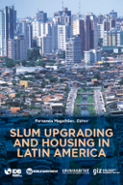Slum Upgrading and Housing in Latin America
Date
Oct 2016
EDITOR
Magalhães, Fernanda
The Latin American and Caribbean region has pursued a variety of policies with respect to slum upgrading and prevention, but the available literature does not provide a description of these experiences and their outcomes. This book examines the policies of three countries in the region, Brazil, Chile, and Colombia, which are notable for the breadth of their policy interventions and their diversity. These three countries have taken different routes but together provide a strong representation of the panoply of choices. The policies share a common feature of emphasizing access to housing of slum residents, but de-emphasizing other key issues related to slums, including fundamental issues of urban development. While this characterization of the region's policies is well known, the design and diversity of the policies that led to these outcomes are not. A key lesson of this book is that there are many methods to upgrade slums by improving the supply of housing for the poor, including slum clearance combined with resettlement and new housing developments without slum clearance. However, by failing to address broader issues that promote the emergence of slums, they may not leave slum residents any better off than they were before.



